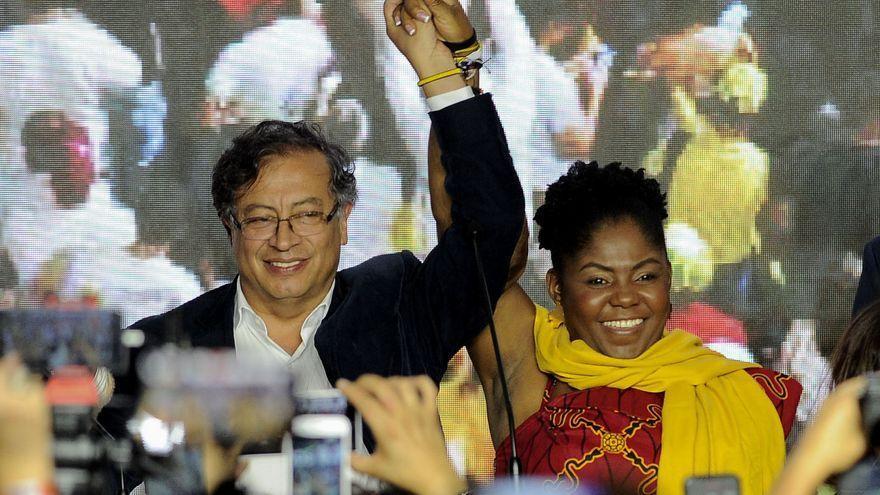
![]() 14ymedio, Yunior García Aguilera, Madrid, June 21, 2022 — Latin America has voted again with its left hand. Gustavo Petro’s victory in Colombia breaks a historic wall that had kept his country on the right for 200 years. Among the causes of his unprecedented triumph is the deterioration of traditional political forces, unable to reinvent their proposals in the face of a completely new reality.
14ymedio, Yunior García Aguilera, Madrid, June 21, 2022 — Latin America has voted again with its left hand. Gustavo Petro’s victory in Colombia breaks a historic wall that had kept his country on the right for 200 years. Among the causes of his unprecedented triumph is the deterioration of traditional political forces, unable to reinvent their proposals in the face of a completely new reality.
Nor can the impact of the pandemic, which accelerated popular discontent and caused a social explosion between April and June 2021, be ruled out. In addition, the Uribe leadership didn’t know how to handle the complexities of the peace process that, in the end, have placed Petro in the presidential sash. The Colombian left has achieved with the polls what it could not achieve with weapons. And society has not voted with its brain or heart, not even with its stomach: it has voted with its liver.
During the 20th century, there were several times when the left about to govern by electoral means, but in the context of the Cold War, the United States wasn’t willing to allow it. Latin America was shaken by various coups d’état that installed far-right dictatorships. Pinochet, Somoza and Videla caused panic in the face of possible communist expansion and shed rivers of blood in order to defend their notions of freedom.
At the opposite extreme, the Cuban dictatorship shot, imprisoned or banished anyone who dared to express an opinion against its doctrine, while exporting armed revolutions from the Rio Grande to Patagonia. With the collapse of the USSR, the United States softened its positions to the south and stopped seeing the victories of the left as threats to its national security. Fidel Castro, for his part, could no longer continue investing in expensive rebel enterprises and decided to use his tentacles to put his allies in power through a more sustainable path: the ballot box.
Then came the “pink tide” headed by Chávez, Lula, Evo, Correa and the Kirchners, among others. The Cuban regime was appointed as official guru and used its very long experience in propaganda and its romantic-mystical speech. The new great enemy would be neoliberal globalization. The successful formula was to shout to the four winds that the identity of the oppressed peoples was in serious danger. The ideologues of Castro-Chavism reformulated the proposals of 21st Century Socialism, presented in 1996 by the German sociologist Heinz Dieterich Steffan.
The São Paulo Forum was joined by ALBA and UNASUR, regional institutions opposed to the Washington Consensus and created with the purpose of establishing, on firm ground, the roots of the socialist clan. The wave advanced as much as it could, although it didn’t reach a tsunami. The deterioration of economies, the fall in the prices of raw materials, the corruption scandals, the death of leading figures, as well as the democratic inadequacies of Bolivarian theory, caused the decline of that crest, tearing it apart against the electoral reef.
However, at the end of the first quarter of a century, the Latin American left hand rises again. It does so in a post-pandemic context, in the midst of Putin’s war, with China pretending to be Swedish as it moves towards becoming the world superpower, with the United States weaker and more ignored than ever, and with the European Union frightened by the winds blowing from the other side of the planet. Global institutions responsible for ensuring peace, democracy and human rights now have symptoms of obsolescence. Humanity is on the verge of radical change, which could lead to a new order or the extermination of the species.
So far, the new Latin American left remains fragmented into three blocs. On the one hand, there is the Cuba-Nicaragua-Venezuela triumvirate, fossils that have survived embedded in the rock of authoritarianism, with strident discourses and policies. Very close to them, but with a more moderate tone, are López Obrador [Mexico], Xiomara Castro [Honduras] and Luis Arce [Bolivia]. All three were absent from the Summit of the Americas and have openly defended the triumvirate. In a third group we see Alberto Fernández [Argentina], Pedro Castillo [Peru] and Gabriel Boric [Chile], somewhat more correct than the previous ones and critical of the dictatorships in the region with which they are ideologically related.
It remains to be seen if Petro’s victory or Lula’s possible triumph unify these blocs and resurrect a cycle that pushes the left to its most sinister side. Among so many waves, there are already those who call our Macondian piece of world “América del Surf.”
Translated by Regina Anavy
____________
COLLABORATE WITH OUR WORK: The 14ymedio team is committed to practicing serious journalism that reflects Cuba’s reality in all its depth. Thank you for joining us on this long journey. We invite you to continue supporting us by becoming a member of 14ymedio now. Together we can continue transforming journalism in Cuba.
